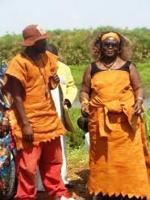Tanzania Culture in Africa
If you have been longing for information about Tanzania Culture, Tanzania People, Tanzania Traditions, Tanzania Taboos, Tanzania Dressing Cord, Tanzania Norms and Etiquette, this page has all in full.
Tanzania has a harmonious national culture, one that is based on a subtle but strong social code of courtesy and respect.
Tanzania's culture is a result of African, Arab, European and Indian influences.
Tanzania is one of the least urbanized countries in sub-Saharan Africa, but traditional African ideals are being deliberately adapted to modern life.
Tanzania's 100 or more different tribal groups are mostly of Bantu origin. The Arab influence on Zanzibar and Pemba islands is evident in the people, who are a mix of Shirazia (from Persia), Arabs, Comorians (from the Comoros Islands) and Bantu from the mainland, though the latter predominate.
Asians are a significant minority especially in the towns and cities. Europeans (either by descent or expatriate) are a smaller minority. The major non-Bantu people on the mainland are the Maasai (Nilotic speakers) who inhabit the northeastern section of the country.
Swahili and English are the official languages, with English the principal language of commerce. There are also many local African tongues, reflecting the tribal diversity of the country.
Outside the cities and towns, far fewer local people speak English than in comparable areas in Kenya. It's said that the Swahili spoken on Zanzibar is of a much purer form than elsewhere, and quite a few travelers head for the island to learn it.
The two main religions are Christianity and Islam, with Hindus making up about a quarter of the population. The majority of Muslims are concentrated along the coast and in the islands.
Compared to Islam, Christianity took a long time to make an impact, and even then (during the 19th century) it was practiced mainly among tribes of the interior.
There are still many tribes who follow neither of the big-name religions and instead worship the ancient spirit of their choice. Principal among them are the Maasai, who put their faith in the god Engai and his Messiah, Kindong'oi, from whom their priests are said to be descended. It's claimed that there is no religious bias present in the country's political and civil administration.
Tanzania culture, music and dance dominates much of East Africa. Strong in rhythm and renowned for hard-hitting lyrics, the country's Swahili-based sounds are kept very much alive by a thriving dance-band scene. Remmy Ongala is the country's best known export. Zanzibar is at the heart of the distinctive taraab, or sung poetry, tradition.
The goddess of this haunting style is Siti bint Saad, the first East African singer to make commercial recordings, way back in 1928. Nyama choma (barbecued meat) has taken over in a big way, especially in restaurants with attached bars.
But on the coast and in Zanzibar and Pemba islands, there's a decent range of traditional Swahili dishes based on seafood. The national brew is Safari Lager and the local liquor is a lethal white-rum-style concoction called konyagi.
The Tanzanians are friendly to foreigners and amongst themselves. Politeness, respect and modesty are also highly valued, so it would be very helpful to learn some Swahili greetings before visiting. Take the time to greet people before you ask them for directions.
Handshakes are very important in social etiquette. Tanzanians frequently continue holding hands throughout a conversation.Note that the right hand is usually used for eating, while the left is traditionally used for toilet duties - you should try not to pass items to others with your left hand.
When receiving items from others, do so with both hands, or with the right hand while touching the left hand to your right elbow.Immodest attire, public affection and open anger are disrespectful to the Tanzanian people.
In Zanzibar, it is important for women to dress modestly out of respect for Muslim cultural beliefs. Men should not wear shorts on the main island, and women should wear dresses that cover their shoulders and knees. This does not apply on Mnemba Island.
Other Tanzanian Cultural Related Pages
Tanzania Culture › |
Germany Colonialist in Tanzania › |
Tanzania Flag › |
Tanzania Cuisines › |
Tanganyika under British and Germany Rule › |
Tanzania Business Dress Cord › |
Tanzania Gender Issues › |
Tanzania Greeting › |
Tanzania History › |
Tanzania Recent History › |
Tanzania Religion › |
Tanzania Folklore › |
Recent Articles
-
Garam Masala Appetizers ,How to Make Garam Masala,Kenya Cuisines
Sep 21, 14 03:38 PM
Garam Masala Appetizers are originally Indian food but of recent, many Kenyans use it. Therefore, on this site, we will guide you on how to make it easily. -
The Details of the Baruuli-Banyara People and their Culture in Uganda
Sep 03, 14 12:32 AM
The Baruuli-Banyala are a people of Central Uganda who generally live near the Nile River-Lake Kyoga basin. -
Guide to Nubi People and their Culture in Kenya and Uganda
Sep 03, 14 12:24 AM
The Nubians consist of seven non-Arab Muslim tribes which originated in the Nubia region, an area between Aswan in southern







New! Comments
Have your say about what you just read! Leave me a comment in the box below.